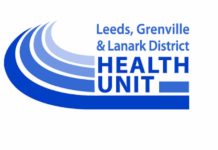submitted by Susan Healey
Leeds, Grenville& Lanark District Health Unit.
Last year, our region experienced a few significant winter weather events which may have caused interruptions in our daily lives. Public Health’s role is to provide information to help communities prepare for the winter season and for possible emergencies or injuries that may occur due to cold weather, ice and snow.
The Leeds, Grenville and Lanark District Health Unit strongly recommend that you prepare yourself and your family (including pets) for future weather-related storms. Winter weather events can cause power outages, delays in delivery of supplies (including food and medication) and dangerous travel conditions.
It is important to have an emergency kit that can sustain your family for a minimum of 72 hours to help you through times when services may not be readily available. When creating your kit, consider sufficient amounts of non-perishable food that can be prepared without cooking, a supply of bottled water, medication, first aid kit, clothing and blankets. Flashlights and extra batteries, and a portable radio will help keep you in touch with your community. Be aware of where important papers are stored and ensure that you can access them quickly if needed. Consider the needs of those who rely on you, including children, those with special needs and elderly parents. Have a plan for where you can meet should you get separated and have a common contact person designated outside of your area so you can let each other know how you are doing. Use the buddy system to check in on family, neighbours and friends.
It’s always best to stay home during inclement weather, but if you must travel, ensure that your vehicle is equipped with winter tires, relay travel plans to a friend or family member and don’t forget to check in after arriving at your destination. Be sure to keep a winter driving survival kit in your vehicle and always check the weather and road conditions before you travel.
When cleaning up from a winter storm, it’s important to be mindful of the hazards such as extreme cold temperatures, icy conditions and heavy snow. Icy conditions can increase your chances of falling and experiencing an injury. Take extra precautions when walking on icy surfaces, walk like a penguin (slow with a narrow stride and feet angled out).
Shovelling heavy snow is certainly a work-out so it’s important to know how to do it without running the risk of injury. Being active regularly (150 min a week) and doing strength training twice a week can help prevent injury as your body will be in better shape when you start. Warm up first, take it slow and take breaks, shovel smaller amounts of snow if the snow is heavy, and use proper technique (bend with your knees and avoid twisting your body).
Extreme cold temperatures can cause hypothermia and unprotected skin can freeze in as little as 10-30 minutes. During very cold weather, everyone is at risk; however the elderly, infants and children, people taking certain prescription medications, and people with pre-existing health conditions are in greater danger.
Winter is great IF you are dressed for it. Canadian winters may be a shock, especially for newcomers to Canada. These tips from the Red Cross are helpful for anyone to use before venturing outside in cold weather:
- Cover your head and upper body to keep heat in.
- Wear a hat and layers of clothing made of wool or synthetic woven fabrics.
- Cover up exposed areas like your ears, nose, cheeks and fingers.
- Change into dry clothes as quickly as possible if you get wet in the cold.
- Avoid tight clothing or footwear that can impair circulation.
- Bring extra clothing along in case you need it.
- Shelter yourself from the wind if you feel cold – a tree, hill, embankment or other shield will work.
Check out the Emergency Preparedness section and Exposure to Hot/Cold Temperatures – Leeds, Grenville and Lanark District Health Unit on the Health Unit website for more information including fact sheets and links to emergency preparedness sites to help you be prepared and stay safe. You can connect with the Health Unit on Facebook and X (formerly Twitter) @LGLHealthUnit for important public health updates. You can also call 1-800-660-5853 with any questions.







